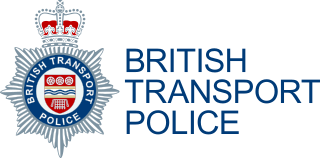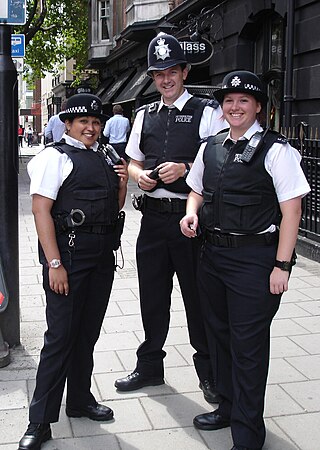A search warrant is a court order that a magistrate or judge issues to authorize law enforcement officers to conduct a search of a person, location, or vehicle for evidence of a crime and to confiscate any evidence they find. In most countries, a search warrant cannot be issued in aid of civil process.
In United States criminal law, probable cause is the legal standard by which police authorities have reason to obtain a warrant for the arrest of a suspected criminal and for a court's issuing of a search warrant. One definition of the standard derives from the U.S. Supreme Court decision in the case of Beck v. Ohio (1964), that probable cause exists when “at [the moment of arrest] the facts and circumstances within [the] knowledge [of the police], and of which they had reasonably trustworthy information, [are] sufficient to warrant a prudent [person] in believing that [a suspect] had committed or was committing an offense.”

An arrest is the act of apprehending and taking a person into custody, usually because the person has been suspected of or observed committing a crime. After being taken into custody, the person can be questioned further and/or charged. An arrest is a procedure in a criminal justice system, sometimes it is also done after a court warrant for the arrest.

The Terrorism Act 2000 is the first of a number of general Terrorism Acts passed by the Parliament of the United Kingdom. It superseded and repealed the Prevention of Terrorism Act 1989 and the Northern Ireland Act 1996. It also replaced parts of the Criminal Justice Act 1998. The powers it provides the police have been controversial, leading to noted cases of alleged abuse, and to legal challenges in British and European courts. The stop-and-search powers under section 44 of the Act have been ruled illegal by the European Court of Human Rights.
A citizen's arrest is an arrest made by a private citizen – a person who is not acting as a sworn law-enforcement official. In common law jurisdictions, the practice dates back to medieval England and the English common law, in which sheriffs encouraged ordinary citizens to help apprehend law breakers.

British Transport Police is a national special police force that polices the railway network of England, Wales and Scotland. The force polices more than 10,000 miles of track and more than 3,000 stations and depots.

Law enforcement in the United Kingdom is organised separately in each of the legal systems of the United Kingdom: England and Wales, Scotland, and Northern Ireland. Most law enforcement duties are carried out by those who hold the office of police constable of a territorial police force.

Search and seizure is a procedure used in many civil law and common law legal systems by which police or other authorities and their agents, who, suspecting that a crime has been committed, commence a search of a person's property and confiscate any relevant evidence found in connection to the crime.
In England and Wales, the sus law was a stop and search law that permitted a police officer to stop, search and potentially arrest people on suspicion of them being in breach of section 4 of the Vagrancy Act 1824. According to a 2018 study in the British Journal of Criminology, stop and search had a marginal impact on crime in the UK.
A police community support officer, or as written in legislation Community Support Officer, is a uniformed member of police staff in England and Wales, a role created by Section 38(2) of the Police Reform Act 2002, which was given Royal Assent by Queen Elizabeth II on 24 July 2002. They are not warranted, but hold a variety of police powers and the power of a constable in various instances by the forty-three territorial police forces in England and Wales and the British Transport Police.

The Serious Organized Crime and Police Act 2005 is an Act of the Parliament of the United Kingdom aimed primarily at creating the Serious Organised Crime Agency. It also significantly extended and simplified the powers of arrest of a constable and introduced restrictions on protests in the vicinity of the Palace of Westminster. It was introduced into the House of Commons on 24 November 2004 and was passed by Parliament and given royal assent on 7 April 2005.

The Police and Criminal Evidence Act 1984 (PACE) is an Act of Parliament which instituted a legislative framework for the powers of police officers in England and Wales to combat crime, and provided codes of practice for the exercise of those powers. Part VI of PACE required the Home Secretary to issue Codes of Practice governing police powers. The aim of PACE is to establish a balance between the powers of the police in England and Wales and the rights and freedoms of the public. Equivalent provision is made for Northern Ireland by the Police and Criminal Evidence Order 1989 (SI 1989/1341). The equivalent in Scots Law is the Criminal Procedure (Scotland) Act 1995.

Vehicle and Operator Services Agency (VOSA) was an executive agency granted trading fund status in the United Kingdom sponsored by the Department for Transport of the United Kingdom Government.
A water bailiff is a law-enforcement officer responsible for the policing of bodies of water, such as rivers, lakes or the coast. The position has existed in many jurisdictions throughout history.
Police officers in various jurisdictions have power to search members of the public, for example, for weapons, drugs and stolen property. This article concerns searches of members of the public who have not been arrested and who are not held in detention. For search powers in relation to those persons see Search on arrest and Searches in detention. For searches of property, rather than people, see search and seizure.

Figures on crime in London are based primarily on two sets of statistics: the Crime Survey for England and Wales (CSEW) and police recorded crime data. Greater London is generally served by three police forces; the Metropolitan Police which is responsible for policing the vast majority of the capital, the City of London Police which is responsible for The Square Mile of the City of London and the British Transport Police, which polices the national rail network and the London Underground. A fourth police force in London, the Ministry of Defence Police, do not generally become involved with policing the general public. London also has a number of small constabularies for policing parks. Within the Home Office crime statistic publications, Greater London is referred to as the London Region.
The powers of the police in Scotland, as with much of Scots law, are based on mixed elements of statute law and common law.
The powers of the police in England and Wales are defined largely by statute law, with the main sources of power being the Police and Criminal Evidence Act 1984 and the Police Act 1996. This article covers the powers of police officers of territorial police forces only, but a police officer in one of the UK's special police forces can utilise extended jurisdiction powers outside of their normal jurisdiction in certain defined situations as set out in statute. In law, police powers are given to constables. All police officers in England and Wales are "constables" in law whatever their rank. Certain police powers are also available to a limited extent to police community support officers and other non warranted positions such as police civilian investigators or designated detention officers employed by some police forces even though they are not constables.

The Criminal Justice (Scotland) Act 2016 is an Act of the Scottish Parliament which reformed criminal practice and procedure in Scotland. The act was intended to "modernise and enhance the efficiency of the Scottish criminal justice system".







